Today’s Guest
Dr. Karen Becker:
I’m so excited to introduce to you today’s guest, Dr. Karen Becker, a world-famous veterinarian who is known for her unique perspective on the importance of feeding dogs raw, natural, species-appropriate diets.
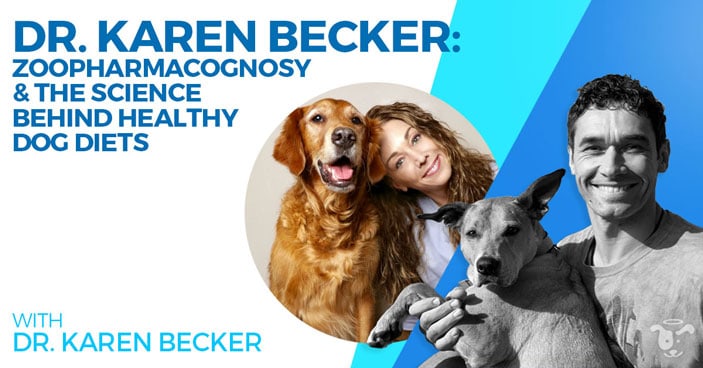
Dr. Becker has shared a love for animals since childhood, saving bugs on the road and doing everything in her power to ensure the wildlife around her was safe and sound. This passion led her to a career in animal rehabilitation, which then ultimately led to her becoming a veterinarian.
Dr. Becker’s story isn’t quite like every other vet’s, however. Growing up in a healthy proactive home, along with her education in zoopharmacognosy has provided her with a perspective on how to properly feed dogs that you won’t find within many vet offices.
If you’re curious about how to determine what your pup should be eating, along with the science behind how it all works, this is a podcast you don’t want to miss!
You’ll Hear About:
- [01:00] Who is Dr. Karen Becker
- [03:00] Dr. Becker’s Journey to Vet Care
- [08:30] Why Pet Food Education is Important to Dr. Becker
- [12:30] Evolutionary Animal Food
- [15:30] The Challenges of Modern Vet Care Education
- [18:30] Our Responsibility as Pet Parents
- [21:30] The Science behind Zoopharmacognosy
- [26:30] The Benefit of Letting Dogs Eat Grass and Dirt
- [32:00] Is All Pet Kibble Bad?
- [34:00] The Benefits of Varied Diet
- [36:30] Nurturing Your Dog’s Microbiome
- [38:30] How Making Small Changes Can Make a Big Impact
- [49:00] Learn More About Dr. Becker and Her Work
How You Can Get Involved
Keep an eye out for Dr. Becker’s new book, The Forever Dog, coming out in October, 2021.
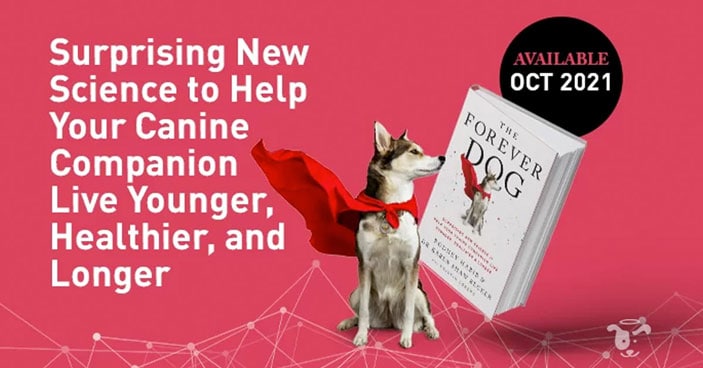
Educate yourself about pet health and well-being so you can be an advocate for your dog. A great place to start is Dr. Becker’s podcast show and the docufilm, Pet Fooled!
Links & Resources
- Website: https://www.drkarenbecker.com/
- Facebook: https://www.facebook.com/doctor.karen.becker
- Instagram: https://www.instagram.com/drkarenbecker/
- Twitter: https://twitter.com/drkarenbecker
- YouTube: https://www.youtube.com/user/MercolaHealthyPets
- Podcast Show: https://healthypets.mercola.com/podcast.aspx
- Dr. Becker’s new book, The Forever Dog: https://foreverdog.com/
- Docufilm Pet Fooled: https://www.youtube.com/watch?v=K1axZ9vSjmI
Learn more by tuning into the podcast!
Thanks for listening—and again, don’t forget to subscribe to the show on iTunes / Spotify to get automatic updates.
Cheers,
~Doggy Dan
|
Dr. Karen Becker: |
The research on the amount of chemicals that dogs are eating is just off the charts. Our pet foods are pretty contaminated because we're not feeling organic. But at the same time, there are other aspects about pet food that can cause dogs and cats to have major metabolic roadblocks in the sense that they're too high in carbohydrate and they are potentially not enough wholly absorbable protein to maintain organ function.
|
|
[00:00:30] Voiceover: |
Welcome to the Doggy Dan Podcast Show, helping you unleash the greatness within your dog.
|
|
Doggy Dan:
[00:01:00] |
Hello, and welcome everybody to another edition of the Doggy Dan Podcast Show. And I know I say this every time, but it's always true. I am so excited because today, we have with us a very special person, Dr. Karen Becker, who is one of the world's most famous holistic vets. And I don't just say that like it's true. She has a degree in veterinary medicine. She's certified in acupuncture, homeopathy, rehab. She's one of the most followed veterinarians in the world with over two million Facebook followers.
|
|
[00:01:30] |
She lectures internationally, writes about all sorts of species of animal appropriate nutrition on many different platforms. And she played a big role in the very famous movie, Pet Fooled, I'm sure a lot of you have watched. She has a huge passion for protecting wildlife and is licensed by the US Fish and Game to rehome endangered wildlife through her nonprofit, Covenant Wildlife. She's also appeared on TEDx and believes in a common sense approach to creating and maintaining vibrant health for companion animals. Dr. Karen Becker, welcome to the podcast.
|
|
[00:02:00] Dr. Karen Becker: |
Well, thank you so much for that amazing welcome. Thank you, Doggy Dan. It's really great to be here. And I appreciate you inviting me on your podcast.
|
|
Doggy Dan: |
No, pleasure is all hours. I know you're incredibly busy. So, I thought rather than me ... I like to start with a very open question. Tell us a little bit about yourself and your story or journey of how you got to be here. And yeah, what you've done?
|
|
Dr. Karen Becker: [00:02:30] |
Well, honestly, I think I had that kind of beginning where a lot of veterinarians end up saying the same type of cliché thing, but it's the truth. I just knew I was meant to be connected with animals from the time I was born. I have a strong unction to save things, anything, bugs, spiders, worms, toads, lizards, frogs, anything. And that just was apparent in my soul and in my heart from the time I was a little girl.
|
|
[00:03:00] |
So, I went through life rescue initially starting out rescuing and saving wildlife. And that morphed into rescuing and saving dogs and cats through high school working at my local Humane Society. And that turned into getting a degree in wildlife biology and management. And then that turned into a degree in veterinary medicine. And then that turned into me wanting to prevent my patients from getting sick before. I didn't want disease to occur and then have the heartbreak myself as the doctor but also watching my beautiful clients go through the pain.
|
|
[00:03:30] |
And I thought there just has to be a more common sense way of addressing disease, like how about if we educate people how to not get disease, what can we do to prevent the body from breaking.
|
|
[00:04:00] |
So, a little bit like you, I graduated all bright eyed and bushy tailed like most veterinarians. I was raised in a proactive home. So, I already knew. And this is what I realized early on in my veterinary career, I recognize that not everyone approaches healing, recovery from disease, or injury with a proactive mindset. So, I assumed starting my first veterinary job, that my boss and my colleagues would be interested in intentionally preventing disease from occurring.
|
|
[00:04:30] |
But not only was that not their mindset, I realized that across the board in most veterinary professions that we are still trained in a disease reactive model, whereas my goal, of course, when the body gets sick, I would want to have a wide arsenal in my toolbox to be able to help the body in a nontoxic fashion recover from disease or injury.
|
|
[00:05:00] |
But above all, knowing that we have everything from autoimmune disease and cancer, organ degeneration, musculoskeletal degeneration, we have all these degenerative conditions, I don't want my body to go through that midlife and I just believe wholeheartedly that most pet parents if given the choice would say I will do everything I can to prevent that from occurring, but they don't know what to do and they're veterinarians weren't taught. So, I decided to also just change the system by changing my approach and that has led me to a wildly fulfilling career in, of course, treating animals, but also educating my peers.
|
|
[00:05:30] |
I'll educate anyone, talk to anyone that will listen, so pet parents and my colleagues and my peers on both sides of the fence. I just think the better conversation we can have about how to prevent the body from breaking, not only the healthier animals that we'll have, but most certainly, the most peaceful journey we'll have in terms of preventing symptoms and extending health span, which means the number of times you go to the veterinarian, but also lifespan, which means we keep those blessed animals in our homes longer. So, seems like a pretty darn good approach to me. And that's my background.
|
|
Doggy Dan: |
That's awesome, awesome. I had to smile when you talked about saving bugs from a young age. I know that feeling of ... Yeah, I saw a beetle floating around in my dog's water bowl. And I looked at it, I thought it was dead. So, I left it there. And the next day, I realized it was still alive.
|
|
Dr. Karen Becker: |
Gosh.
|
|
[00:06:00] Doggy Dan: |
So, I fished it out and we put it on the wood ... It's like I'm heading towards 50 and here I am still-
|
|
Dr. Karen Becker: |
That's good.
|
|
Doggy Dan: |
... fishing out little animals out of the water.
|
|
Dr. Karen Becker: |
Very good.
|
|
Doggy Dan: |
It's great, isn't it?
|
|
Dr. Karen Becker: |
That's beautiful. You know I wish, I think first of all, empathy is something that needs to be cultivated and celebrated.
|
|
Doggy Dan: |
Yeah.
|
|
Dr. Karen Becker: |
I also think that as we go through life, I think it's a beautiful thing when we can become more sensitive to the needs of the creatures around us and not less, so you're headed in the right direction.
|
|
[00:06:30] Doggy Dan: |
Oh, yeah, yeah. The thing which gets me is I know the bug's life is saved and the bug is probably very happy, the beetle, but I get so much joy out of it. I mean, I'm not quite fist pumping. But it's like, yeah, what did you do today? Look at people driving to work, what did you do today, I saved a life.
|
|
Dr. Karen Becker: |
And you did. And you did.
|
|
Doggy Dan: |
I did. It might not have been a cat or a dog, but it was, somebody's going, yay.
|
|
[00:07:00] Dr. Karen Becker:
[00:07:30] |
That's beautiful. And I think if everyone just saved or attempted to enhance the well-being of whatever life is in their path, whether that's a plant, but just if we can attempt to nurture whatever crosses our path today, bugs, plants, whatever, people, broken people, broken kids, if we can attempt to nurture and love just who passes by us in a day, we would be well on the way to shifting the world in a very short period of time.
|
|
|
And that's one of the things I think as pet owners, guardians, pet parents, all those terms that inflame everyone, but whatever you want to call yourself, I call myself my dog's person, I think that, of course, we're passionate about certain things like some of us love certain breeds, and some of us love certain foods, and some of us, we're passionate about things within the dog space.
|
|
[00:08:00] |
But lest we not forget that we all are, we're interconnected with all of life, and that it's completely okay to obsess about one of the amazing animals in the animal kingdom like dogs. I am also dog obsessed. But I think it goes a long way for us to keep an open mind about the fact that all of life is has the goal of thriving and of doing the best that it can and oftentimes, it needs help. And that help just may need to come from us.
|
|
[00:08:30] Doggy Dan:
[00:09:00] |
Wow, I already feel like we could chat for hours and the podcast has already taken a different direction than I thought it would, which is beautiful. I love it when that happens. Animals, just love animals all around. So, when you started talking, you were telling us about how you got into the helping the dogs. What about the dog food specifically? When did you kind of start going, it's the food. There's something really wrong with the food?
|
|
Dr. Karen Becker: |
Yeah.
|
|
Doggy Dan: |
Was it a long period of time? Was it with a couple of specific dogs? Or was there a specific issue of behavioral problem or medical issue? Yeah, how did that come about?
|
|
Dr. Karen Becker:
[00:09:30] |
Such a good question. Actually, my obsession with food started with a fascination with food which started when I was a little girl with the exposure to real food versus food-like particles. And what I mean by that is I grew up in this super proactive home, where my parents, they exercise every day, still do. They're 83 and they still exercise. They get five kilometers a day and they do all of these amazing proactive things to keep their body strong and their brains strong and their range of motion up and they eat organic and they eat free range and they're just active, proactive people trying to live their best life every day, amazing.
|
|
[00:10:00] |
So, I grew up in this kind of I feel wildly blessed home, but I could not call it average. I grew up in a really healthy home. So, first of all, being role modeled to healthy lifestyle habits is a massive blessing because it just is intuitively natural for me to do these things. What I realized is that most people didn't have necessarily, they may have been wildly loved, but they didn't have wild guidance on how to intentionally create health.
|
|
[00:10:30] |
So, my background was different because I had that. But let me tell you, as a wildlife rehabilitator, I had the best advice for my wildlife rehabilitator mentor, Dr. Barbara was a beautiful woman in Horicon, Wisconsin, and Ms. Harvey, as people knew her, Barbara Harvey. She only rehabilitated hawks, eagles, owls and Falcons, so the raptors.
|
|
[00:11:00] |
And her statement to me was, "Karen, I have the best success in the world." She has the worldwide best average of saving raptors. And she said, "Part of the issue is I give them their living species-appropriate food source." And she said that involves raising mice and rats and she said, "I have to feed them mice and rats because that's what nature intended them to eat." So, whereas other rehabilitators put raptors on hamburger or what's called BOP, bird of prey diet, which is ground up horse meat. It's completely gross. That's a whole different story.
|
|
[00:11:30] |
But she said, "Whereas other rehabilitators will feed kind of processed mechanically separated foods to raptors, food and healing are intimately connected." And so, as a young girl at 14 years of age, when I had my mentor wildlife rehab person say to me, "Food matters and your animals will heal faster on real food," I was able to then as I went through my internships, I saw animals eating ultra-processed foods.
|
|
|
And she was right, Barbara Harvey was right. They didn't heal as fast and they didn't recover as fast. And actually, I would venture to say that those wounds, whether they were hit by car or electrocuted or dealing with a fracture, those wounds got infected more. They were slower to recover when they weren't given their evolutionary food source.
|
|
[00:12:00] |
So, then I became a wildlife biologist, and of course, recognized immediately that animals are meant to eat their evolutionary food source and as closely as possible, recognizing that we can't always mimic that. But our goal is to try. Then I interned at the Berlin Zoo. And the Berlin Zoo does some pretty amazing things. Not only do they try and minimize the amount of ultra-processed foods that they're giving their wild animals, their goal, again, was to mimic these animals' evolutionary food sources.
|
|
[00:12:30] |
So, if you have a hummingbird, nectar is their evolutionary food source. If you have a lion, their evolutionary food sources are typically small mammals. And so, you would not try and rock that balance. You would not try and make a highly carnivorous animal into a vegan and you would not try and make vegan animals into omnivores. And this made perfect sense not only as a wildlife biologist, but working at the zoo, they really tried hard to give unprocessed, minimally processed, minimally refined foods. They wanted to give natural foods to these wild animals. I love that.
|
|
[00:13:00]
[00:13:30] |
Then I get out into practice and realize that the vast majority of well-loved animals are only eating ultra-processed foods. And even our government say things like, "Listen, if you want healthier kids, try and minimize the amount of highly refined foods and try and increase the amount of fresh foods." Everyone across boundaries, colors, states, countries, everyone knows that the more fresh foods we can feed our kids and the less fast food or junk food is better. Except veterinarians didn't get that memo.
|
|
|
And veterinarians are the last remaining group of healthcare professionals that still advocate feeding entirely processed foods from birth till death. In fact, veterinarians go so far as to say that fresh foods could be dangerous or toxic, or you don't want to get an upset stomach, or they've not been researched and dog's evolutionary food source doesn't have enough research behind it to actually feed that.
|
|
[00:14:00] |
So, in the last 100 years, Dan, we've done this amazing job of not just undermining all sense of common steps, really, with pet parents and guardians, but veterinarians themselves being educated by a system that was partially endowed or funded by ultra-processed pet food companies. Veterinarians don't graduate with the tools they need to have objective conversations about the quality of foods going into their patients' bodies.
|
|
[00:14:30] |
So, when clients come and say, "Hey, listen, I'm not quite sure it's a great idea to be feeding foods that have been cooked four times at super high temperatures, creating all of these unnatural byproducts in the food that I've read like advanced glycation end products that can really raise havoc on organ systems and create organ disease and early degeneration. I don't know if it's a good idea."
|
|
|
And most veterinarians are stuck saying things like this ultra-processed, little brown crunchy ball, we were taught to tell you that it's everything your dog needs, never switch their food, and that's about the end of the conversation.
|
|
[00:15:00] |
And so, when I realized what my training told me as a wildlife biologist and as a proactive wellness human in the wellness space, when I became a veterinarian, I was so dismayed at the gap between my awesome professionals that have not been able to connect the dots and my awesome clients that know exactly what they want to do, but they didn't have the tools or the resources to be able to do it. So, I have spent my career literally trying to unite people who want to do better for their dogs and cats, but they don't have the tools or the resources.
|
|
[00:15:30] |
And then again, trying to educate veterinarians, which has proven to be really hard, because veterinarians graduate thinking that they know enough, and a lot of veterinarians don't necessarily want to keep learning or growing beyond what they learned at that school. So, I have my work cut out for me in both realms.
|
|
Doggy Dan: |
Look, on behalf of the hundreds of thousands of millions of dogs that have lived a better life because of your work, they say, "Thank you." They say, "Thank you." Yeah.
|
|
[00:16:00] Dr. Karen Becker: |
Well, I have to say, it is incredibly humbling but so inspiring to see this army of empowered, knowledgeable pet parents become advocates for their dogs and cats, and advocates in ways that they are not relying on a doctor to tell them what to do. They have done the hard work and research in really knowing in the hearts that they are making the best choices for the animals in their care.
|
|
[00:16:30] |
And not only that literally gives me goosebumps because this educational, really, paradigm shift is happening from pet parents saying. "I lost a dog or cat because of X. And this will never happen to me again. I will never allow myself to not have enough knowledge to not make better choices."
|
|
[00:17:00] |
So, I have millions of pet parents coming to me saying, "My vet isn't up to speed yet. And instead of being angry at my vet for not getting it or angry at my vet for "being conventional" or angry at my vet for not understanding what I'm doing, I am being a light in my community and to my veterinarian and saying, "I am the owner and the guardians of the creatures in my life.
|
|
|
And I take full responsibility for the decisions that I'm making. I'm asking you, veterinarian, to partner with me. And we will together form a health care team that allows my animals to provide me, so I can provide the best for them, and then you will be able to partner with me.
|
|
[00:17:30] |
And together, we can really make the best informed lifestyle decisions for the animals. But dear, veterinarian, I am the one driving the bus. I'm the one calling the shots. I am the one that ultimately is going to make these health and wellness decisions because health and wellness is front and center. It's a massively important to me. And although I understand that maybe you aren't a health and wellness proactive wellness clinic, I am a proactive client and I want to partner with you. And I'm going to run the show and drive the bus.
|
|
[00:18:00] |
And it's amazing. Out of encouraging millions of pet parents to have that conversation with their vet, not only do we have pet parents that are more informed, making better decisions, making their dogs not only recover from disease and degeneration faster, but prevent degeneration from occurring. Veterinarians are looking at these inspired empowered educated clients saying oh my gosh, they are creating really healthy animals. The healthiest animals at my practice happened to come from people who are self-educated. And that's also super inspiring. Yeah, so inspiring.
|
|
[00:18:30] Doggy Dan: |
It's back to power to the people almost and it's a return to nature, back to nature, right.
|
|
Dr. Karen Becker:
[00:19:00] |
It is, it is. And it's just recognizing, I think, as a community, that the health and wellness of our animals rests in our hands. It's easy to want to blame your vet or blame whatever. But the truth is, if we have committed to care for an animal, that animal's entire well-being, physical, emotional, mental well-being rests in the palm of our hands. And every decision we make about that dog, cat, animal, whatever we're caring for, every decision has a health outcome.
|
|
|
So, we need to choose wisely. We really need to think about every decision we're making because our dogs and cats don't have a choice. They would choose differently if we gave them an opportunity to choose, but we make decisions for them and sometimes not with enough knowledge to make the best decisions.
|
|
[00:19:30] Doggy Dan: |
Yeah, I've often thought I would love to do a test where you get five different plates of food down for the dog, maybe some dry kibble and then some raw meat and then some processed meat and all just five different plates of very different types of food, and just let the dogs go and eat which one they want to eat and see which one they choose. Because I'm sure, most of my dogs go for the fresh meat mix.
|
|
[00:20:00] Dr. Karen Becker: |
You know it is such a ... That would be an awesome study. It's also to highlight not just what macronutrients dogs would pick. So, macronutrients are how much fat would he eat first or second, or how much protein would he eat first or second. And then how much carb would he eat.
|
|
[00:20:30] |
Now interestingly, Dr. Mark Roberts actually did that study on macronutrients and he has a pretty interesting result. Dogs and cats, both the study has been duplicated by a different set of researchers, but both of those macronutrient choice studies have already been done. And as you can imagine, kitties being obligate carnivores, they choose protein and fat first and carbohydrates are a ... I'm just not going to say a distant third. Kitties will only eat carbs if they have to, to meet a caloric requirement. Kitties will choose to never eat carbs.
|
|
[00:21:00] |
Interestingly with dogs, dogs chose fat first initially, and then protein immediately after, and then continue eating throughout the course of the study, more protein than fat and very little carbohydrate. Some dogs chose to self-select a little bit more carbs. But all in all, both dogs and cats, when given unlimited amounts of carbs, proteins and fats usually keep their carb intake at less than 15%.
|
|
Doggy Dan: |
Wow.
|
|
Dr. Karen Becker: [00:21:30] |
Which gives you pause when you think about the average bag of ultra-processed kibble being anywhere between 40 and 70% carb, you can see where malnourishment despite being overfed, where lacking the key proteins coming from meats as well as vitamins and minerals, fatty acids found in foods, you can see where us not feeding dogs or kitties in a biologically appropriate fashion can lead to first metabolic disease, and then physical decline. It's not a hard thing to think about when we think about macronutrients being off. But Dan, do you talk to your followers or your listeners about zoopharmacognosy?
|
|
[00:22:00] Doggy Dan: |
No.
|
|
Dr. Karen Becker: |
Do you know what zoopharmacognosy is?
|
|
Doggy Dan: |
No, I don't. I'm fascinated. Tell me and tell us all about it. Yeah.
|
|
Dr. Karen Becker:
[00:22:30] |
So, zoopharmacognosy, zoo meaning animals and pharma meaning pharmacopoeia, pharmacy meaning a lot of different substances that can spark a healing response or a physiologic change is altered. And then, cognosy is the knowing. And so, it's animals' innate knowing of what they need to eat in the wild to make themselves healthy.
|
|
Doggy Dan: |
Got it.
|
|
Dr. Karen Becker: |
And as a wildlife biologist, you study this all the time, which means we know that animals will eat certain leaves as a purgative if they have worms. Animals will eat certain foods that are higher in vitamin D. Wolves scavenge on more acorns in the fall because they're higher in vitamin E. And then evolutionarily, they're going to eat more seafood or fish, which means they need more vitamin E.
|
|
[00:23:00] |
I mean, the body calls what we would call instincts for cravings for certain foods. There's been a whole set of science developed recognizing that animals have the ability to consume things in their environment that have a healthy, physiologic response. And so, along that same vein, just looking at what wild dogs and cats would choose to eat and why gives us really good insights as to how we can better provide for our animals in a captive situation.
|
|
[00:23:30] |
When I say a captive situation, dogs are no longer wolves. We need to be clear about that. Dogs, even though they share a lot of DNA with wolves, dogs are domesticated and no one's arguing that.
|
|
[00:24:00] |
But their nutritional requirements, even though dogs can process more starch and they absolutely can, in my own personal viewpoint after interviewing all sorts of geneticists and epidemiologists and physiologists for The Forever Dog book, my own personal viewpoint supports that of what all of those experts state, in that because dogs evolved, dogs went through humans as a coevolutionary path during the ag revolution.
|
|
|
And during the ag revolution, when we figured out how to plant corn and how to grow crops, we love dogs that when we were hunter and gatherers, we fed them all of our meats and berries and plants.
|
|
[00:24:30] |
And when the ag revolution came by, we love dogs even more, and we fed them all of the corn and wheat and rice that we started to grow. Of course, dogs; bodies are resilient and thank God for evolution because if dogs didn't evolve to eat corn, wheat and rice during the ag revolution, they would have died. But dogs didn't die, they evolved and they started producing a lot more of the digestive enzyme, amylase. And amylase is necessary to process carbohydrates.
|
|
[00:25:00] |
So, it's not that dogs can't eat carbs, they can. They just don't need a ton of carbs because despite the fact that they can eat carbs and process them, too many carbs for dogs does the exact same thing that too many carbs for humans does. It jacks our blood sugar up. We become insulin resistant. We gain weight. It can trigger all sorts of biologic and metabolic processes that are not wildly healthy for humans or dogs.
|
|
|
And those are interesting conversations, especially when you talk with experts in those fields of just how similar dog diseases mirror human diseases now, especially in this century of modern fast food, convenient foods that taste amazing.
|
|
[00:25:30] |
We have the opportunity for a lot of overconsumption and a lot of eating too much and not moving enough that ultimately messes up our brain chemistry and our organ resiliency. And the same is true for dogs.
|
|
Doggy Dan: |
Yeah, there's so much crossover. And I know humans and dogs were very different species in many ways. But in many other ways, we're still all animals.
|
|
Dr. Karen Becker: |
Yes.
|
|
Doggy Dan: |
Even you were talking about the, I forget the name for that, I forget the word, epizoology.
|
|
Dr. Karen Becker: |
Yes.
|
|
Doggy Dan: |
You know what I mean?
|
|
Dr. Karen Becker: |
Zoopharmacognosy, yeah.
|
|
[00:26:00] Doggy Dan: |
That word, where the animals know what to eat. And I think my dogs, often in several different properties, I've noticed my dogs will often start licking in ... They kind of find like a clay and they lick and eat the clay from the ground. And I know there's a mineral in there. It feels like it's a vitamin or a mineral, zinc or magnesium or something that gets some salty, something from that clay they're getting and I'm like, "What is it you want?" Because they all do it. They take it in turns.
|
|
Dr. Karen Becker: |
Exactly.
|
|
Doggy Dan: |
They put the nose down the hole, and yeah.
|
|
[00:26:30] Dr. Karen Becker:
[00:27:00] |
So cool. And it is so cool. And what I would tell you is, and this is what all of the top researchers told us as well, that as long as your dogs are in clean environments, which means you're obviously not spraying your backyard with pesticides, herbicides weed killers, if you're in a relatively nontoxic chemical-free environment, allowing your dogs to nibble grasses, giving dogs free choice and freewill is such a powerful way to not only enhance your relationship with them, and allow your dog to better show you who he or she is, which is going to allow you to be a better guardian.
|
|
[00:27:30] |
Along that same vein, giving you dogs choices with just simple everyday pleasures when we're walking. Do you want to turn left or do you want to turn right? Do you want to go straight or do you want to run? Do you want to keep going or do you want to go back home? Letting our dogs have choice is one of the cardinal foundations of quality of life. It's one of the ways that we measure well-being and life satisfaction is where we're able to make the decisions that we needed to make for them to be the best versions of ourselves.
|
|
[00:28:00] |
And when we think about how much we control our pets, we control when they eat, and we do need to most of the time control how much they eat. Just think about in my situation then, if there was a hand from heaven that just gave everyone their daily calories, we would all be visions of health. So, freewill is a muckety-muck for humans.
|
|
Doggy Dan: |
Yeah.
|
|
Dr. Karen Becker:
[00:28:30] |
But the truth is when it comes to dogs, we just decide everything for them and giving dogs a little bit more choice in their life. If they want to stop and smell something, if you're having a sniffari, and they're really obsessed with smelling a certain area or obsessed with scratching the ground and then tasting a little bit of the soil, or your dogs that want to sequentially eat a little bit of that limestone, mucky clay soil that's right on the edge of the lake that dogs obsess about, letting dogs be dogs in that way is also allowing them to fulfill this zoopharmacognosy, which means that their instincts are telling them, "I want the broad tall green weeds," is what we're going to call them.
|
|
[00:29:00] |
"And I'm going to bypass all sorts of grass until I found the exact grass I want because I'm lacking in digestive enzymes and potassium today and I know that that grass is going to give it to me."
|
|
[00:29:30] |
So, you'll see your dogs pull, all out pull to get to a certain weed. And generally speaking, as long as it's unsprayed, allowing your dogs more opportunities to make choices not only enhances your dogs' trust in you, which is a foundational daily thing that you want to reaffirm, but it also does amazing things for your dogs' brain chemistry in that dogs need to smell and dogs need to smell a lot and dogs need to move their bodies.
|
|
|
And so, as dogs were able to go outside and have bright light hit their eyes in the morning or as the sun sets in the evening, dark as a sun setting, dogs had this amazing reaction in their eyes that produces melatonin and that's how dogs set their circadian rhythm.
|
|
[00:30:00] |
They have to go outside at night and then their bodies say, "Okay, it's nighttime. I'm going to start turning on my sleepy nighttime, go to bed hormones." And then in the morning, dogs are meant to go outside, get direct, bright blue light hitting the back part of their eyes, their retinas that allows for their wake up hormone called melanopsin to be released, and that sets their circadian rhythm.
|
|
|
If we allow dogs the opportunity to go outside and do this, then their circadian rhythm will reset. And during this time, if they can take in their environment, they can smell who peed in the mailbox, and they're able to nibble a little bit of grass, we're giving them this emotional mental experience, along with a little bit of physical exercise.
|
|
[00:30:30] |
So, if we think about all of the things that makes a dog's day happy, yes, they want to dig. Yes, they want to smell. Yeah, they want to move their bodies a lot. They want to run and they want to hop and they want to play. And allowing dogs the opportunity to express themselves in their full dogism on a regular basis is one of the best ways that we can add healthspan to our dog's existence.
|
|
[00:31:00] Doggy Dan: |
Wow, I can't believe it, back to nature. We could probably do a lot of that ourselves and benefit from an early morning walk, as you're saying, your parents do the walking morning and evening.
|
|
Dr. Karen Becker: |
You bet. You bet.
|
|
Doggy Dan:
[00:31:30] |
So, for people who are listening to this, and are thinking, so, is my dog food bad, we haven't really gone into much. I'm sure some people know a little bit and some people know a lot. But for those people who are wondering if they're not on the best food for their dogs, what would you say? And I know it's a huge topic, but...
|
|
Dr. Karen Becker: |
It is.
|
|
Doggy Dan: |
Yeah, and is there anything-
|
|
Dr. Karen Becker: |
Sure.
|
|
Doggy Dan: |
I guess a specific question as well is because I know you're not a big fan of kibble understandably, are there any ingredients in kibble which people could kind of go and do a quick check and go, "Oh, my gosh, these are the top five or top three things that I should be looking out for, some preservatives, which are really bad," something like that? Can you chat a little bit about that maybe? Yeah.
|
|
[00:32:00] Dr. Karen Becker:
[00:32:30] |
There's so many different avenues that you can go down, because just answering the question like, is my pet food bad. It depends on the amount of pet food ... Any food, even the most beautiful free range, ethically-sourced, minimally-processed, chemical free, glyphosate free, if that food is overfed, so if you're taking really healthy food and making a dog obese with it, that's great food that's creating a health problem.
|
|
Doggy Dan: |
Yes.
|
|
Dr. Karen Becker: |
Likewise, if you're feeding a beautiful food, but you never switch, so you're feeding the same protein, so just a lot of chicken, let's say, just a whole lot of chicken. Chicken is really high in omega 6 fatty acids. And what we know about omega 6s is, over time, those are the proinflammatories and that they have to be well balanced with the anti-inflammatory omega 3 fatty acids coming from seafood, fish-based sources.
|
|
Doggy Dan: |
So-
|
|
Dr. Karen Becker: |
Yeah.
|
|
[00:33:00] Doggy Dan: |
So, can I just jump in there? What's fascinating, that kind of goes contrary to what we're told by a lot of the vets who say, this is the perfect dog food. A lot of the manufacturers, obviously, they say this is the perfect food, you don't need to ever change.
|
|
Dr. Karen Becker:
[00:33:30] |
Exactly. And I'm so glad that you said that, Dan, because that is so true. And if you think about it, if you're selling a product and if you want a client for life, of course, the best thing you could say is, listen, one step beyond, it's not good for dogs, never switch their food. One step beyond that would be it could be bad for your dogs. People have fear that they're actually harming their dogs by switching food.
|
|
|
And what I would share with you is the research is just undeniable that the more variety that we have, the research has been done on dogs, it's been done on cats, and it's been done on humans, and it's been done on mice.
|
|
[00:34:00] |
The more different types of proteins and the more different types of prebiotic fibers coming from low glycemic roughage, that means veggies like kale or Jerusalem artichoke or asparagus, you offering this incredible diversity of polyphenols coming from a variety of beautiful veg and antioxidants coming in the form of antioxidant rich, colorful fruits and veggies, by offering this myriad of different foods, nutrients, and vitamins and minerals coming in from different food sources that does a bunch of different things, of course, it hyper-nourishes our bodies, which is excellent, but it also nourishes our dog's microbiome. And the microbiome is what ultimately sets your dog's immune system.
|
|
[00:34:30] |
And what we know without question is that never switching your food for our own bodies as humans is one of the worst things we can do. When we interviewed Dr. Tim Spector, who is one of the most cited microbiologists in the world. He's out of King's College and his statement was, "I can think of nothing more destructive to a dog's immune system long term than eating a highly processed exact same protein day after day, month after month, year after year."
|
|
[00:35:00] |
He said it's the recipe for full blown health disaster. And if you think about it, that's how we feed dogs. And it's because the pet food companies have said, "Never switch your dog's food."
|
|
|
So, right there, I'm going to tell you, so back to your question, like, what's the best food. The more diversity you can feed, the better.
|
|
Doggy Dan:
[00:35:30] |
Can I jump in one more time? I love what you're saying. Because I've always said this and I've never actually heard that there's been a study done that's kind of improved. And so, yeah, so basically saying, yeah, it's an old school, old advice. And we've moved on from feeding the dog the same thing all the time.
|
|
|
And I used to say to my customers, "I love spaghetti bolognaise. I love spaghetti bolognaise." But if I had to eat spaghetti bolognaise every single day of my life for breakfast, dinner and tea, can you imagine how boring it would become and probably I can feel it how sick I would become? I probably become immune to it.
|
|
Dr. Karen Becker:
[00:36:00] |
Exactly. And let's just say, even if you loved it, let's say you didn't get sick of spaghetti every day, your microbiome would hone down. So, the diversity of the beneficial gut bacteria in your gut and all the prebiotic fibers you need from other food sources besides spaghetti, all of those things get shut down and you end up creating a very negative, fragile, nondiversified microbiome.
|
|
[00:36:30] |
And we know that 70% of your dog's microbiome is responsible for creating a healthy immune response. And with then, along with that a lack of microbial diversity comes the downsides of heating your food to high temperatures. You probably are aware of this. But when you heat sugar or carbs and protein together, you create these unwanted chemical reactions in food. And that creates secondary compounds that are very damaging. They cause organ failure, immune system problems, allergies, autoimmune disease, cancer.
|
|
[00:37:00] |
They're called advanced glycation end products, probably the biggest issue and why most governments are telling humans to stop eating so much ultra-processed snack foods is because of these advanced glycation end products that raise hell on the gut and they raise hell on the body. They create inflammation and they cause early degeneration in the body.
|
|
[00:37:30] |
And so, okay, eating a little bit of processed food, fine, we all do it. But if you think about it, this is like feeding your kids snack foods as their sole source of nutrition with a multivitamin added, a good vitamin, multivitamin, lab-made synthetic plus junk food their whole life. And it's no wonder that we're looking at each other saying, "I'm not sure." Common sense would tell us that our dogs need more than just a little brown crunchy ball day in and day out.
|
|
[00:38:00] |
And so, in addition to just rotating through different brands of pet food, my suggestion would be to rotate through different types of pet food and to go from super high heat, multiple refined pet foods like extruded, dry food, backtrack that to minimally processed food. So, some people say, "I'm not doing raw." Okay, cool. If you don't want to do raw food, I get it. How about sterile raw? The vast majority people say, "What's sterile raw?"
|
|
[00:38:30] |
Sterile raw is commercially available raw diets that have been pasteurized, so hit with really freezing cold water to sterilize them and it's sterile. They're sterile diets. So, people say I'm nervous about bacteria. Sterile raw foods are the safest foods on the market. And people say, "No, I still don't want to do that because I don't have a big freezer space." Okay, cool. What about freeze dried foods? Freeze dried foods are raw meats and veggies that are nutritionally complete that have been freeze dried. How about that? Because all you have to do is add water, reconstitute it and significantly less heat damage in those foods.
|
|
[00:39:00] |
And if people say, "Listen, I don't want to make raw. I don't want to do freeze-dried. How about if I cook it myself?" And that's a beautiful option. You can do homemade diets, either raw or gently cooked. It is important that you follow a recipe so you're making sure that you are meeting your dog's minimum nutritional requirements or that you know how to add in enough pieces and parts to be able to make sure your dog is not going to be nutritionally deficient. It's really important.
|
|
[00:39:30] |
But homemade meals are an awesome way to reduce your pet food bill, to increase the amount of nutrition that your dog or cats are eating, and then at the same time provide this incredible nutritional diversity because you're giving rabbit and chicken and ostrich and beef and quail and goat. You're not just sticking with one protein. You can rotate through feeding a variety of proteins and you're not just feeding one type of fiber. You can rotate food through and feed a variety of different types of fibers.
|
|
[00:40:00] |
Even if you stop buying ultra-processed dog treats and just switch to fresh food treats out of your fridge, you can dramatically improve your dog's health. Even if you do nothing else and never switch their food, just switching to some fresh food treats is a brilliant way to dramatically improve your dog's microbiome and in turn their immune system. So, there's little things you can do without having to completely change your dog's diet that can really improve the overall health and well-being of your dog's long term.
|
|
Doggy Dan:
[00:40:30] |
Wow. I'm aware of the time and I could chat forever with you. But one thing I'd love to know is have you seen, I'm sure you have, but can you give us an idea of the sort of improvements in dog's health? Is it just a lifespan thing? Is it less injuries, less sickness on the organs of the dogs? Or is it just all round? And can it be measured? Yeah.
|
|
Dr. Karen Becker:
[00:41:00] |
Great question. Yes. So, there are some things that can be measured. So, for instance, you can measure your dog's kidney function, liver function. You can measure your dog's inflammatory markers, like homocysteine is an inflammatory, but you can measure what's called C-reactive protein and dog, which is another inflammatory marker. There are some tests you can do to find out how your dog is of course doing on the inside.
|
|
[00:41:30] |
But most people choose to think about food as being information. And the information that we're nourishing your dog's bodies with, we want to make sure that we're sending them the correct information. And we also want to reduce the amount of tagalongs, which means we're not interested in feeding a bunch of glyphosate, which is roundup, which is what happens if we're feeding food that contains corn, wheat, or other foodstuffs that have been sprayed with glyphosate, your animal is eating that.
|
|
[00:42:00] |
And the research on the amount of chemicals that dogs are eating is just off the charts. Our pet foods are pretty contaminated because we're not feeding organic. That's one kind of metabolic hill that they have. But at the same time, there are other aspects about pet food that can cause both dogs and cats to have major metabolic roadblocks in the sense that they're too high in carbohydrate, and they are potentially not enough wholly absorbable protein to maintain organ function.
|
|
|
So, you could end up with liver degeneration, kidney generation from mycotoxin. So, mycotoxins are these funguses that you can't smell or taste or see on your bag of ultra-processed food that comes in from grains. If your pets are eating mycotoxins, which is a massive problem in the pet food industry that causes everything from kidney, liver failure to cancer.
|
|
[00:42:30] |
So, what you end up seeing is why are my animals eating what I believe is the top of the line, I bought it from my veterinarian, or I spent 120 bucks for a bag of this food. And I'm seeing everything from chronic GI issues, so IBS to just gas vomiting, diarrhea to all out inflammatory bowel disease, where animals have allergies to certain foods, then we have obesity issues from too many calories and not enough nutrients.
|
|
[00:43:00] |
So, when you look at the top reasons dogs go to the veterinarian, we have to look at the top things that eating an ultra-processed diet does to our bodies. And we know that it causes weight issues. We know that it can absolutely cause allergies or immune system upregulation is the general term that we'll say. So, there can be allergic reactions. That's a big reason dogs go to the vet. Chronic ear infections and skin infections, a big reason why dogs go to the veterinarian and then GI problems.
|
|
[00:43:30] |
And when we trace back the roots of what are all these common, not life-threatening symptoms, but all symptoms that absolutely decreased quality of life and potentially quantity of life, what do they all have in common? They all have in common a diet that is not nutritionally metabolically nourishing an immune system in a way that allows for the body to fix and heal and recover on its own.
|
|
[00:44:00] |
So, what happens? The body starts breaking and the body breaks midlife. And you go back to your veterinarian with pesky symptoms year after year with an animal that never is quite healthy. And so, looking at the environmental influences on what could be done, food is just one of those variables.
|
|
[00:44:30] |
What your house, the genetics is a whole nother conversation we could have and stress and the environment around the home, in your backyard, in your home, looking at all of the things that impact a dog's overall well-being and we kind of focused on food at this podcast. But think about training techniques that are stressful and think about physical stressors. I mean, there's all of these things.
|
|
[00:45:00] |
Dogs really are amazing at dealing with all of these different variables and they do it graciously and they don't complain. And at the end of the day, they love us. They love us, regardless of whether we're making fantastic choices for them or whether there could be some room for improvement. And I guess I feel like, if we have the opportunity to learn enough to make better choices, why wouldn't we?
|
|
Doggy Dan: |
Oh, what a beautiful way to finish the podcast. Basically, they just have unconditional love for us no matter how bad our decisions.
|
|
Dr. Karen Becker:
[00:45:30] |
Yeah, yeah. And then, the guilt is something that as humans, I tell and that's one thing I think we should say, Dan, in conclusion is that as guardians, as dog owners, we deal with a lot of guilt. We beat ourselves up that we can't afford the right food. We beat ourselves up that I have to work 16 hours at a job I hate and I don't have time with my dog at home. We just beat ourselves up over everything.
|
|
[00:46:00] |
And one of the things I guess I would say in conclusion is that we have to do the best we can put the tools and information that we have at the time. And then we have to let ourselves off the hook and be really gentle and easy with ourselves. Forgive ourselves for what we didn't know. But then also, make it a goal to if you have been hurt so badly from a lack of information in one realm, work on getting enough information that you can protect and safeguard your heart against ever making that mistake again.
|
|
[00:46:30] |
And once you realize, okay, I feel good about this topic, the universe has a way of presenting to us things that either we should maybe be looking at or that we're inspired to look at or topics that we're curious about. As we go through this path, this journey on life, being inspired to learn about different things, I think that we need to be thankful for the information that has made us a better dog owner this year than last year.
|
|
[00:47:00] |
And for everything that we didn't know, recognize that we're on this path and that we're going to make mistakes, and we're going to look back and want to make changes. But we are doing the best that we can and our dogs forgive us and love us anyway. Anyway. So, deep breathing and telling yourself that you are the best guardian that you can be at this time, space reality is a really important thing.
|
|
Doggy Dan:
[00:47:30] |
100%, wow. That's beautiful. Beautiful. I've learned so much. So appreciate you taking the time to be with us today. I know there was so much stuff I was thinking we might get on to although I knew we probably wouldn't make it talking about pet food. And you've got a new book coming out and you've got a number of websites, Dr. Becker Bites.
|
|
Dr. Karen Becker: |
Oh, actually, that's my momma's treat company.
|
|
Doggy Dan: |
Yeah.
|
|
Dr. Karen Becker:
[00:48:00] |
That's adorable. So, actually, so when I opened my animal hospital like, I don't know, in 1997 I think is actually when it was, there was no human grade all-meat treats on the market. So, my beautiful momma handmade dog treats. And she still ... Well, now she's retired, but my brother, John, makes handmade dog treats. But I'm actually not involved with the treat company. It is a completely adorable all handmade family run tree company. But you will not be able to reach me there because I am not a part of that, other than telling them that I love them.
|
|
[00:48:30] |
My website is drkarenbecker.com. But the book website, which covers everything I kind of chatted about today we have touched on in the book and we have some solid research behind it all, which is I think the most inspiring part is looking at how science is starting to affirm what the common sense things that we know in our heart to be true, science is starting to confirm those things. And it's just really exciting. And that website is foreverdog.com.
|
|
|
And the book, The Forever Dog, will be published through HarperCollins on October 12th. And we're really excited to get this into the hands of everyone that desperately wants to know more, because we put this book together for you.
|
|
Doggy Dan: [00:49:00] |
There you go, guys, drkarenbecker.com. And for those of you who don't know how to spell Becker, it is B-E-C-K-E-R dot com, and foreverdog.com. And I'll be putting all the show notes up and all the links to everything to do with Dr. Karen Becker. And that would be at theonlinedogtrainer.com/drkarenbecker. So, hopefully, yeah, I'm sure everyone's listening going, "Well, want to know more," go to any of those websites and yeah. Is there anything else you'd like to say or add before we finish? It's just been such a pleasure.
|
|
[00:49:30] Dr. Karen Becker: |
Well, I love that you are interested in food or nutrition, and of course, all of the things that make dogs tick. I love that you're interested in learning more about all of those things. And I appreciate you for inviting me on your show.
|
|
Doggy Dan: |
Yeah. Well, thanks for joining us and love to have you back sometime in the future. Yeah. Awesome. What a pleasure.
|
|
Dr. Karen Becker: |
Beautiful. Thank you.
|
|
Doggy Dan: |
Have a great day. Thanks. Thank you so much.
|
|
[00:50:00] Dr. Karen Becker: |
And just forward me when you're ready to publish, just send me a link, and I'll be happy to share it. I'll help you get the word out.
|
|
Doggy Dan: |
Oh, that'd be awesome.
|
|
Dr. Karen Becker: |
Yeah, that'd be beautiful.
|
|
Doggy Dan: |
That'd be awesome.
|
|
Dr. Karen Becker: |
No problem. Just send it along and I'll help.
|
|
Doggy Dan: |
Appreciate it. I'll send you another link as well of a couple of links to one of my dearest dog. When I send you the links, one of them is me singing a song and one's a little dedication to her. And then you kind of know where I'm coming from because I think we're coming from-
|
|
Dr. Karen Becker: |
I love that.
|
|
[00:50:30] Doggy Dan: |
Yeah, yeah, she was one of those special dogs. I can feel we're coming from the same place for the love of all of animals. And yeah, that we're all connected, feel them.
|
|
Dr. Karen Becker: |
So good.
|
|
Doggy Dan: |
Yeah.
|
|
Dr. Karen Becker: |
So good.
|
|
Doggy Dan: |
Yeah.
|
|
Dr. Karen Becker: |
Well, thanks, Dan. And I look forward to connecting with you next time.
|
|
Doggy Dan: |
Yeah. Have a beautiful day. Lovely connecting. Take care.
|
|
Dr. Karen Becker: |
Thanks, you too.
|
|
Doggy Dan: |
Take care. Bye-bye.
|
|
Dr. Karen Becker: |
Bye-bye.
|
|
Doggy Dan: |
Bye.
|
|
Voiceover: [00:51:00] |
You've been listening to another episode of the Doggy Dan Podcast Show, bringing you one step closer to creating harmony with your dog.
|
Sign up to receive email updates
Enter your name and email address below and I'll send you periodic updates about the podcast.



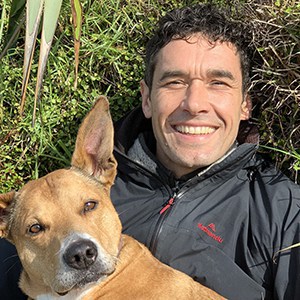
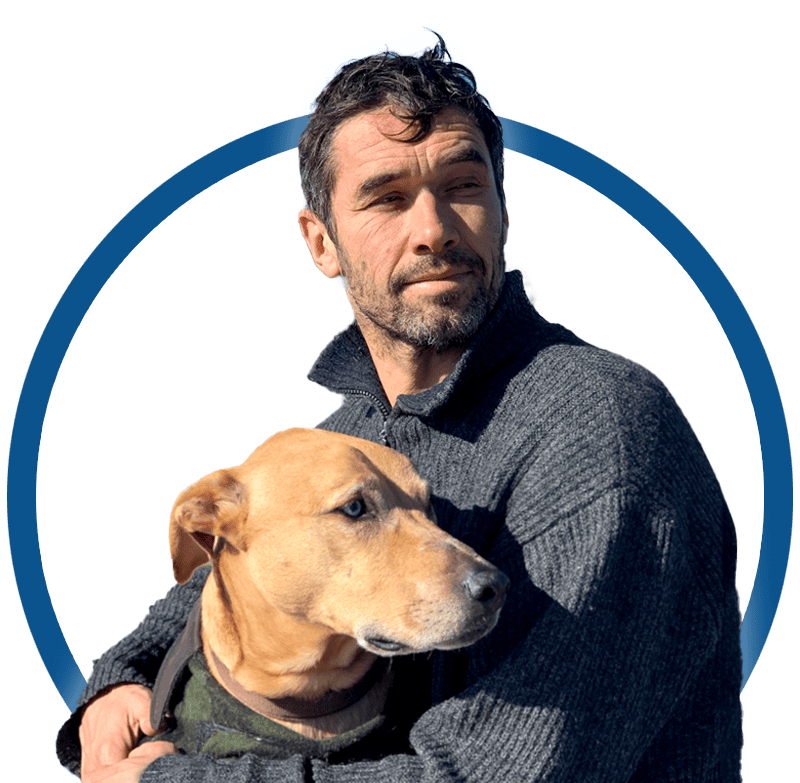
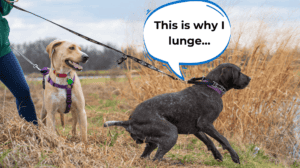

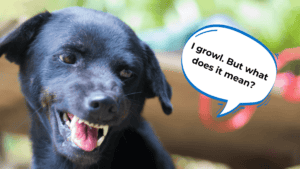


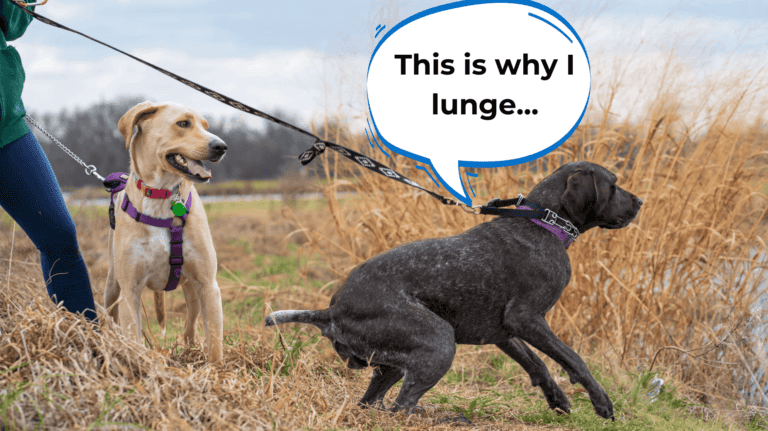

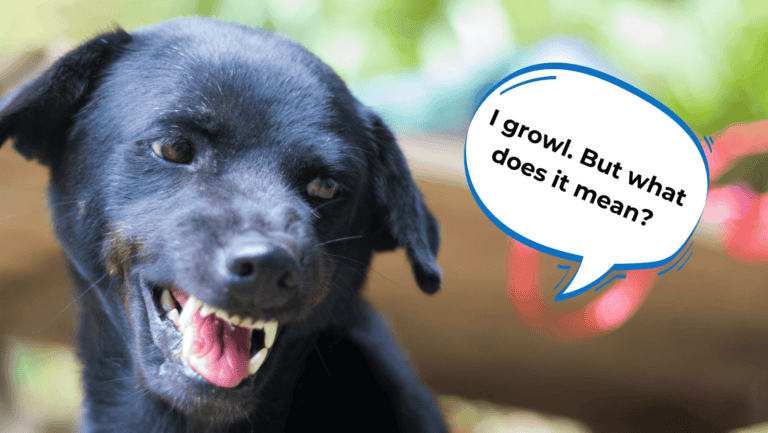
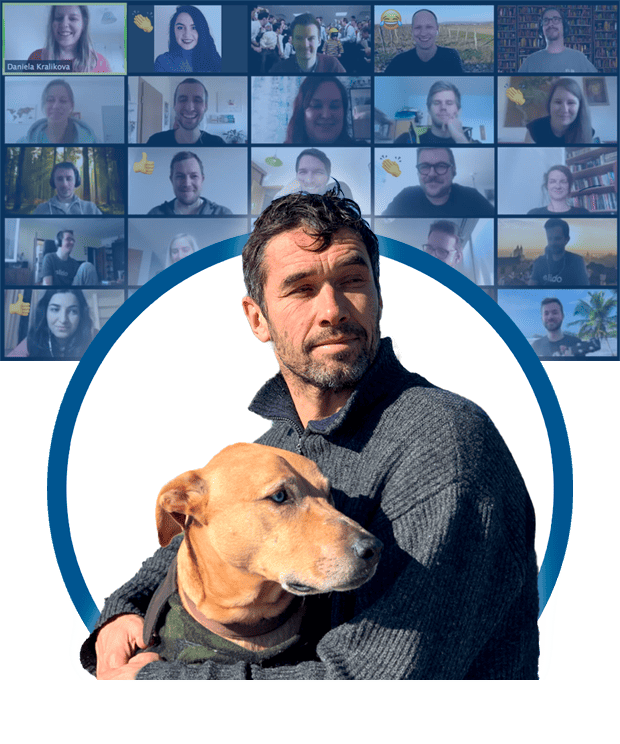
2 Responses
G’day Doggy Dan and Dr. Becker,
Thanks for this podcast. It’s nice to find sources with like mindsets that want to love on our furry friends while providing info to help us make healthy decisions for our pets.
I look forward to the day when I can share about the success I’ve experienced with supplements as my dog’s drastic improvement with a vet and they are genuinely interested in what worked versus telling me to let them know when I want to give my dog pain medication. I look forward to the change in veterinary schools where they see the benefits of a holistic practice in addition to traditional training.
My dogs come running when I’m at the blackberry bush because they want some of that goodness too! It’s fun watching them try to eat the berries that are within their range.
I feel reassured after listening to this podcast that I’m doing right by my dogs regarding their diet (grain free kibble with freeze dried treats or veggies from the fridge).
Thanks!
Warmly
Linda in OR, USA
Thanks for your fantastic feedback Linda and I’m really glad you enjoyed this podcast! Dr. Becker is incredibly knowledgeable in her field and my aim is always to provide information that is helpful for dog owners…..and also makes their dog’s life a little better as well! All the Best, Doggy Dan